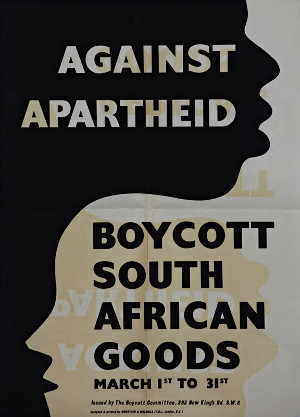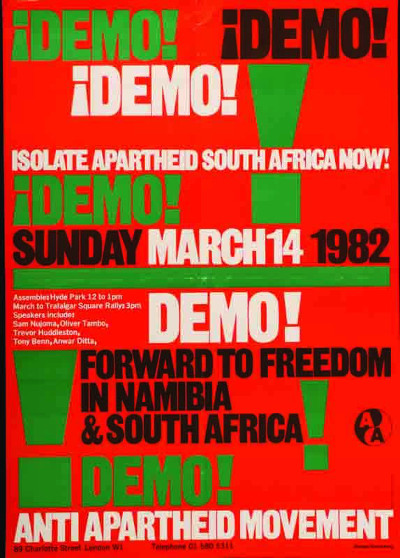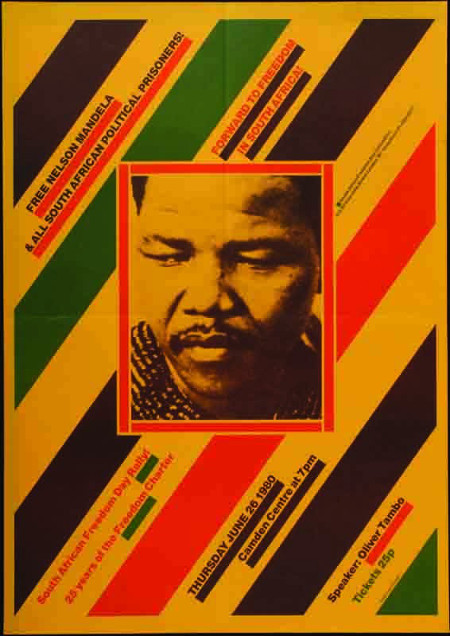Archives Hub feature for July 2014
The Anti-Apartheid Movement – Archives held at the Bodleian Library, University of Oxford

For over three decades the Anti-Apartheid Movement (AAM) campaigned for a boycott of apartheid South Africa and support for all those struggling against it. Founded in 1959 as the Boycott Movement, the AAM grew into the biggest ever British pressure group on an international issue.
What was Apartheid?
Apartheid was a unique system of racial segregation and white supremacy in South Africa. For nearly three centuries Africans were dispossessed and exploited by Dutch and British colonists. In 1948 apartheid (‘apartness’) became official policy. The National Party, elected by an all-white electorate, extended and formalised separation and discrimination into a rigid legal system.
Most of the land was allocated to whites, and Africans were confined to barren overcrowded ‘homelands’. Black workers in so-called white areas were required to carry passes at all times. They lived in townships outside the city centres and were paid below subsistence wages.
Health and education facilities were segregated and those for blacks were hugely inferior to those for whites. The system was kept in place by a battery of repressive laws, under which people could be detained indefinitely without trial.
The Anti-Apartheid Movement in the UK
Some of the most compelling material held in the AAM archive at the Bodleian library has been included in a new website ‘Forward to Freedom: The history of the British Anti-Apartheid Movement, 1959–1994’ at http://www.aamarchives.org.
This site features selected video, photographs, posters and documents from the AAM’s archive at the Bodleian Library, University of Oxford. Highlights are footage of the Wembley stadium Nelson Mandela tribute concert in 1988, iconic posters from campaigns to save the Rivonia trialists from the gallows in 1964 and to stop the Springbok cricket tour in 1970, and letters from Prime Minister Margaret Thatcher arguing against sanctions on South Africa.

Also included are more than 50 interviews with former anti-apartheid campaigners including musician Jerry Dammers, actor Louis Mahoney, Lord David Steel, (AAM President in the 1960s), and grassroots activists who tell what motivated them to get involved.
It shows the wide range of interest groups who took action against apartheid, from students who campaigned for universities to disinvest in the 1970s to British trade unionists who supported resurgent South African trade unions to church groups who campaigned for South Africa’s withdrawal from occupied Namibia.
Other archives related to the Anti-Apartheid Movement
The Anti-Apartheid Movement in the UK had many affiliate branches, partner groups and organisations working alongside them towards their shared aim of ending Apartheid. Some of these also have their archive descriptions included in the Archives Hub.
The Anti-Apartheid Movement in Scotland
Branches supporting the AAM organisation existed in Glasgow and Edinburgh through the 1960s, with 1976 seeing the establishment of the Anti-Apartheid Movement Scottish Committee.
The object of the Scottish Committee was to further the work of the Anti-Apartheid Movement, especially in Scotland, being responsible for the recognition of local Anti-Apartheid groups in Scotland and their admission into membership of the Anti-Apartheid Movement.
Activities in Scotland incorporated a number of specific areas that were the focus of international campaigning on South Africa, including sports, cultural, retail and academic boycotts, campaigns against nuclear and military collaboration, loans to South Africa, and for oil sanctions. The Movement’s work was not limited to South Africa. It was one of the first organisations to highlight the “unholy alliance” between apartheid South Africa, the racist regime in Rhodesia (now Zimbabwe), and Portuguese colonial rule in Africa.
This archive is held at Glasgow Caledonian University and belongs to Action for Southern Africa Scotland – their site can be found here: http://www.actsascotland.org.uk/.
Lawyers against Apartheid
Also held at the Glasgow Caledonian University site is the archives for Lawyers Against Apartheid. Lawyers Against Apartheid was formed following a legal conference in December 1986 to mobilise the support of the legal community in Great Britain for the liberation struggles in South Africa and Namibia. Membership was open to all members of the legal community in Britain, including practitioners, academics, students and legal workers. The group was affiliated to the Namibia Support Committee, London, and the Anti-Apartheid Movement.
The first official meeting of the group was in London in January 1986, where it was decided that their aims were to include exposing the nature and illegitimacy of the apartheid regime to the British legal community, campaigning for anti-apartheid policies and practices within the British legal community, and providing advice and assistance to the local anti-apartheid groups. The group challenged the established ideas of the South African legal system, especially the myth of impartial hearings from an independent tribunal, and also promoted the issue of Prisoner of War status for captured freedom fighters and supported the campaign for Namibia’s independence following South Africa’s illegal occupation.
Lawyers Against Apartheid met quarterly, usually in London, and had sub-groups working on specific issues such as Prisoners of War, Domestic Legal Support, International Law, and Trials & Punishments, until their disbanding in 1996.
The original deposit, which consisted mainly of books, pamphlets, serials, and posters, has been supplemented with two additional deliveries of predominantly archive materials.
Paul Flieshman
Mimas Development Officer
Collections
A selection of the collections relating to apartheid on the Archives Hub:

Records of Anti Apartheid Movement Scottish Committee, pressure group, Glasgow, Scotland. 1965-1994 (predominant 1976-1994). http://archiveshub.ac.uk/data/gb1847-aams
Records of Lawyers Against Apartheid, pressure group, London, England. 1977-1996 (predominant 1986-1991).
http://archiveshub.ac.uk/data/gb1847-ghjarc/la
Granada Television: Broadcast on Apartheid, 1977-1987. http://archiveshub.ac.uk/data/gb101-ics119
Archive of the Bishop Ambrose Reeves Trust, 1965-1996. http://archiveshub.ac.uk/data/gb162-mss.afr.s.2348
Papers of Howard Barrell, 1989-1993.
http://archiveshub.ac.uk/data/gb162-mss.afr.s.2151
Papers of Mervyn Bennun , Late 20th century.
http://archiveshub.ac.uk/data/gb29-eulms112
All images copyright the Anti-Apartheid Movement Archive, and reproduced with the kind permission of the copyright holder.
